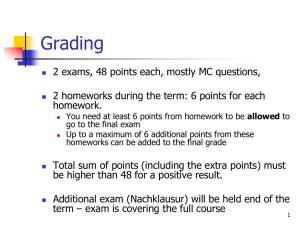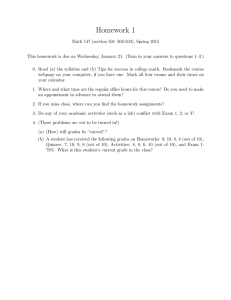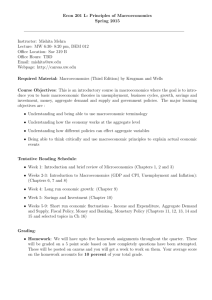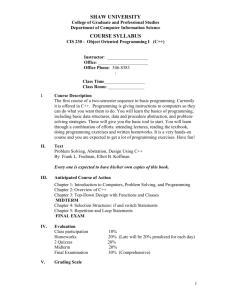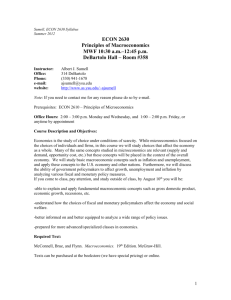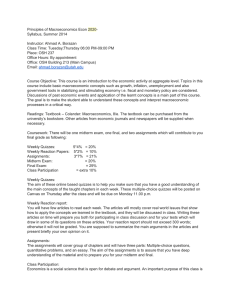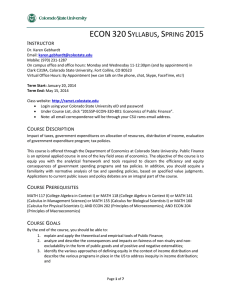Colorado State University Fall 2014 Econ 304-001 Intermediate Macroeconomics
advertisement
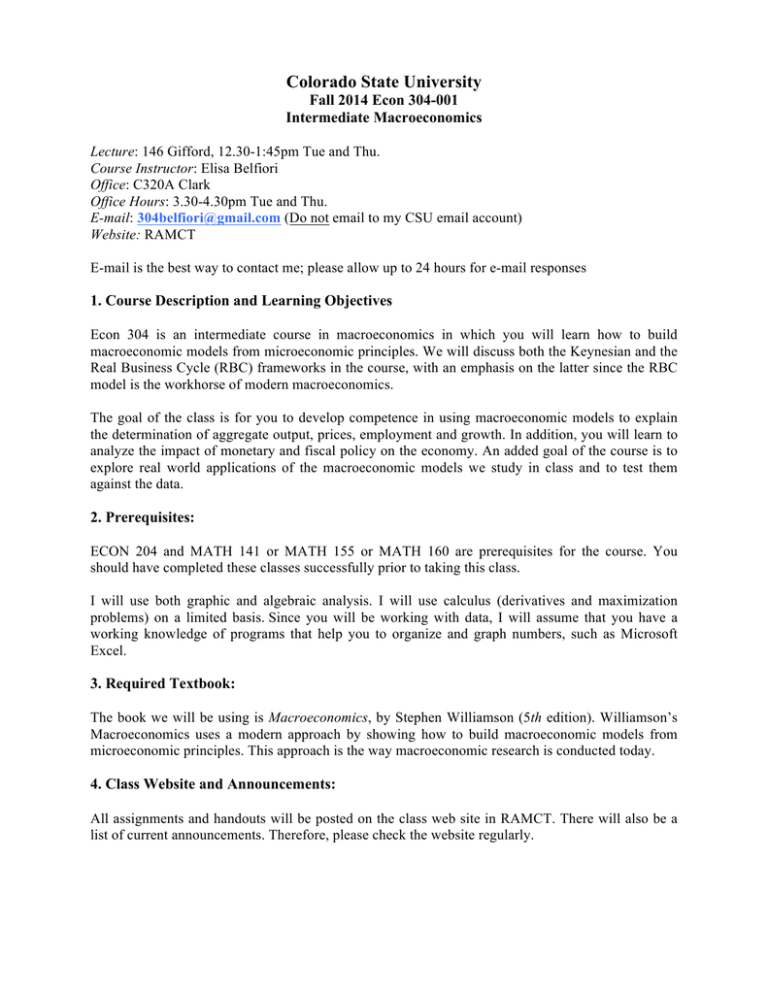
Colorado State University Fall 2014 Econ 304-001 Intermediate Macroeconomics Lecture: 146 Gifford, 12.30-1:45pm Tue and Thu. Course Instructor: Elisa Belfiori Office: C320A Clark Office Hours: 3.30-4.30pm Tue and Thu. E-mail: 304belfiori@gmail.com (Do not email to my CSU email account) Website: RAMCT E-mail is the best way to contact me; please allow up to 24 hours for e-mail responses 1. Course Description and Learning Objectives Econ 304 is an intermediate course in macroeconomics in which you will learn how to build macroeconomic models from microeconomic principles. We will discuss both the Keynesian and the Real Business Cycle (RBC) frameworks in the course, with an emphasis on the latter since the RBC model is the workhorse of modern macroeconomics. The goal of the class is for you to develop competence in using macroeconomic models to explain the determination of aggregate output, prices, employment and growth. In addition, you will learn to analyze the impact of monetary and fiscal policy on the economy. An added goal of the course is to explore real world applications of the macroeconomic models we study in class and to test them against the data. 2. Prerequisites: ECON 204 and MATH 141 or MATH 155 or MATH 160 are prerequisites for the course. You should have completed these classes successfully prior to taking this class. I will use both graphic and algebraic analysis. I will use calculus (derivatives and maximization problems) on a limited basis. Since you will be working with data, I will assume that you have a working knowledge of programs that help you to organize and graph numbers, such as Microsoft Excel. 3. Required Textbook: The book we will be using is Macroeconomics, by Stephen Williamson (5th edition). Williamson’s Macroeconomics uses a modern approach by showing how to build macroeconomic models from microeconomic principles. This approach is the way macroeconomic research is conducted today. 4. Class Website and Announcements: All assignments and handouts will be posted on the class web site in RAMCT. There will also be a list of current announcements. Therefore, please check the website regularly. 5. Course requirements 5.1 Class participation Class attendance is not mandatory but is expected and recommended. There will be a Class Discussion Board in the course website in RamCT. I ask that you do not email me any question about the material we are covering in the class or about the assignments. I will not respond to these emails. Instead, please post your question in the Class Discussion Board in RamCT. In that way, everybody will benefit from your question and everybody will hear my response to it. You can of course email me if you have questions or concerns not related to the class material. I reserve the right to assign bonus points on homeworks and/or exams to students who participate and collaborate in class and online in the Class Discussion Board. 5.2 Short quizzes There will be 12 multiple-choice quizzes during this course. I will post the quizzes and determine the due dates in an ongoing basis, depending on the topics covered every week. Quizzes will be due on Tue/Thu before class, on dates to be determined. You will be allowed to have 2 attempts. Quizzes will be posted in RamCT and submitted online through RamCT. No late assignments will be accepted. Only documented special circumstances (i.e. illness) will exempt you from this rule. If you know in advance that you will not be able to complete a quiz on time, you must contact me about this before the due date and submit it early. 5.3 Homeworks There will be 2 homeworks during the course. They will be posted in RamCT. Homeworks are online and have to be completed through RamCT. Homeworks’ deadlines are included in the syllabus and no late assignments will be accepted. Only documented special circumstances (i.e. illness) will exempt you from this rule. If you know in advance that you will not be able to hand in an assignment on time, you must speak to me before the assignment is due and hand it in early. Collaboration among students is allowed and encouraged; however, each student submit their own version of the solution, and everyone who collaborated must be acknowledged at the end of homework. 5.4 Exams There will be two midterm exams and one final exam. The final exam is cumulative, and covers all the material in the course. Exam dates are given in the calendar. There will be no makeup examination for the midterms. In the case of documented special circumstances (a family or medical emergency), your final exam score will replace the midterm exam. If any of these circumstances happen to you, make sure you talk to me before the finals week. 5.5 Hours per week Each week students are expected to: Activity Attend class Contact hours per week 3.0 Read the assigned textbook chapters and other readings Review class notes Complete homework Study for exams TOTAL = 2.0 1.0 1.5 1.5 9.0 6. Grading: The weights for the final score will be as follows: Quizzes (average of 12): 15% Homeworks (average of 2): 15% Midterm Exams (average of 2): 35% Final Exam: 35% The grading scale is: 92%-100% A 90%-91% A88%-89% B+ 82%-87% B 80%-81% B78%-79% C+ 70%-77% C 60%-69% D 0%-59% F I may apply some grade curving depending on the overall class performance. 6.1 Re-grading If you disagree with the grading of a problem set or a test, you may submit it for review. You must have a written argument for why you should be awarded more points. Assignments written in pencil will not be re-graded for any reason. 7. Tentative Course Schedule: Date Week 1 and 2 Chapter (5th Edition) 1,2,3 Week 3 4 Week 4 5 Week 5 7 Week 6 8 Week 7 & 8 9 Topic Introduction Economic Measurement, Business Cycle Measurement Microeconomic Review Consumer and Firm Maximization General Equilibrium Closed, one-period macroeconomic model Homework I due on Sep. 18 Economic Growth The Solow Model Economic Growth Continued Growth Convergence Midterm I on Oct. 2 The Two-period Economy Microeconomic fundamentals Week 9 10 Week 10 & 11 & 12 11 Week 13 12 Week 14 Week 15 17 Week 16 - Inter-temporal Choice Optimal Investment Credit Market Imperfections Homework II due on Oct. 23 Investment A real inter-temporal model with investment Midterm II on Nov. 13 Money A monetary inter-temporal model Money, Banking and Inflation Review Final Exam: 145 Gifford. Dec 19, 9:40 – 11:40AM 8. Academic Integrity This course will adhere to the Academic Integrity Policy of the Colorado State University General Catalog and the Student Conduct Code. You will be asked to sign an Honor Pledge such as: “I will not give, receive, or use any unauthorized assistance” on course assignments. Please refer to the Academic Integrity and Student Conduct policies in the General Catalog: http://www.catalog.colostate.edu/FrontPDF/1.6POLICIES1112f.pdf 9. Disabilities If you have any diagnosed or suspected physical or learning disabilities which may require reasonable accommodations, please contact the Resources for Disabled Students (RDS) office http://rds.colostate.edu/accommodation-process as soon as possible.
